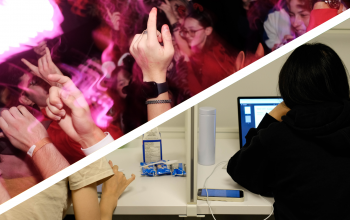Managing the pressure to know your future
Miranda Mirabelli ARTS EDITOR
Illustration: Jennifer Boothby / THE MIKE.
Many students feel the pressure to know exactly what they want to achieve after graduation. This pressure could be due to not knowing if they will find a job, thinking they may not be qualified for jobs they do find, or anxiety over making the wrong career choice. I am here to tell you that these thoughts are normal, and that it is okay to not know what you want to do.
Sometimes we run into rough patches along the way. For as long as I could remember, I wanted to be a nurse. I was very fixated on the idea of helping people, and I was often told it would be a suitable career for me. I was given a rude awakening about my future when, in grade 12, I realized nursing was not for me. That same year, though, I had discovered my passion for writing and editing. My parents were not overly thrilled about my sudden change of plans, but now I feel as if I am where I need to be.
Similarly, Michael Calamia, second-year University of St. Michael’s College (USMC) student pursuing a History major and English and Renaissance Studies minors, has seen his plans change throughout the years as well. He told The Mike, “First I wanted to be a lawyer, and then I changed my mind and chose to pursue teaching. However, I ultimately decided to follow my true passion, and that’s fashion.”
At the University of Toronto (U of T), we have many resources as well as guides to help us make the choice much easier. If you are feeling overwhelmed about your future career plans, try contacting the USMC Registrar’s Office for advice, or even consider going to a Career Counsellor at the Student Success Centre. Ryan Truong is among the many Career Counsellors dedicated to helping students. One of his suggestions is to just make an effort to visit the Career Counsellors’ office. He stated that not only are they there to give sage advice, but they also “provide insight and just simply provide someone to talk to.”
When asked how many students came into her office regarding their futures on a daily basis, an Assistant Registrar at the USMC Registrar’s Office, Feben Alemu stated that it “depends on the time of year. Students tend to come at the beginning or the end of a semester concerned about their grades and applying to graduate and professional programs.” She agreed that many students have trouble choosing a career path, and said that these students “are drawn toward a career path with greater financial rewards, although it may not necessarily be where their talents or passions lie.” Truong agreed with this statement, and said one thing that influences students are finances: having enough money to pay their bills.
Another factor that influences students and their decisions are external. Alemu said that pressure to take a certain career path comes from family and friends. Having a reassuring support system really goes a long way, but if your external sources do not appreciate the pressure you are under, try to help them understand. If there is one thing they will agree with, it’s that your happiness comes first.
Truong says to use the resources provided for students. He said, “U of T provides many courses and sectors to help you broaden your studies.” Volunteering is also something that helps students gain experience and realize if they will enjoy their potential future career.
Fernanda Lara, a fourth-year USMC student pursuing an English major and Linguistics and Classical Civilizations minors, says her plans for the future have definitely changed. “In high school I thought I wanted to be a teacher, but after volunteering at different hospitals I realized that the best way to express my passion for helping individuals with disabilities was to become an occupational therapist,” Lara said.
Another concern among students is not finding a job right away after graduation. Truong explains that many Humanities students worry about the job field and opportunities. Anthony Botticella, a second-year student pursing an English major and History and Geography minors, has his mind set on becoming a teacher. He said, “When I realized that I wanted to teach, it was a passion for me and I could really see myself doing that for the rest of my life. For me, it’s not about the money and the summers off, it’s knowing that I’m going to be doing something I love for the rest of my life and teaching future generations to come.” Teaching is something that has changed throughout the years, and one of the many examples of a career that is limited in job opportunities. Botticella explains that his “biggest worry concerning [his] future would have to be the concern of not finding a job immediately, which is a very serious problem among many newly graduated teachers.”
Alemu encourages students to visit the Registrar’s Office not only to discuss their futures, but to also discuss other options. The harsh reality for some students is their grades do not meet the expectations of graduate or professional programs. She explains that you must know yourself: “If you know you can achieve something but are not achieving it, try to change your goals and improve your habits.” Lara explained that “[her] biggest worry regarding the future is that [she] won’t get accepted into graduate school. It’s really stressful to know that something that is so important is out of your hands.”
Planning your future is stressful, but if you learn from your past and plan in the present, your future will be bright. Alemu also encourages us to use our ACORN account to help out with our preparations. On the left of the website, there is a feature called “Planning Tools” that brings you to a page where you can explore the possibilities of your degree, and find certain programs and courses. The “Degree Explorer” page gives you the option to make a planner of all the courses you could take throughout your years at U of T. It may seem overwhelming at first, but once you get into it, you will begin to feel more at ease. The “Degree Explorer” page also gives you a breakdown of how many courses you need and at what level, how many Breadth Requirements are needed, and more.
There are resources suited to students right on campus, like the Student Success Centre in the Koffler Student Centre building. Not only are there Career Counsellors at hand to go through the steps you need to pursue your career, there many events held at the Student Success Centre to ensure success among students. They offer Career Fairs and “Career Chat: Career Decision Making” seminars, as well as Academic Success Events, which include Study Hubs and seminars such as “Delivering Effective Presentations.” The Student Success Centre not only provides guidance but also affirmation and reassertion that you are in the right place to help sort out your future and how to make you a prosperous student.
One thing both the Registrar’s Office and Career Counsellors will tell you is to be positive. You will get to exactly where you need to be, but you must be patient and trust that it is a learning process. One thing that should come first is your happiness and knowing yourself. Alemu tells students to “discover what you have a passion for and know what you are interested in.” When asked if they had any advice, she says you should make sure to be realistic about your strengths and weaknesses.
Michael Calamia had some insight for students who are struggling with the pressures of finding a career. “I think the most important thing we young people can do for ourselves is finding our true north and never letting go of it. It can be frustrating and often times difficult to find your path but that’s what makes it special to us individually,” he said.
Having a positive outlook is the most important thing when you find yourself stressed when thinking of your future. The resources offered at U of T are here to help us, and remind us that we are in charge of our futures. One thing Truong made sure to tell me was that the future is not set in stone. I think students have trouble grasping this concept mostly because there is so much pressure to make money, support ourselves, and somehow try to be happy too. Students must realize their happiness and health are what’s most important, and finding what you have a passion for is the first step. Lara shared some advice that keeps her going when she thinks of her future, “One of my best friends told me, ‘It’s not the end of the world until it is actually the end of the world.’”
Stay positive, USMC students. Our futures are anything but dim.




